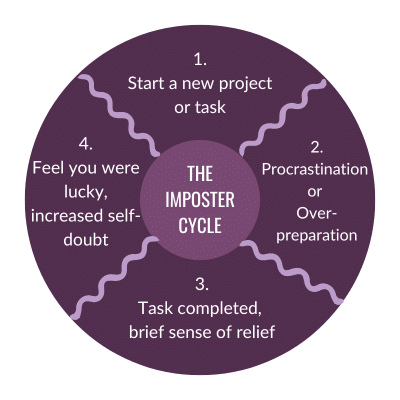Do you regularly feel like you aren’t worthy of what you have achieved? Do you usually attribute these achievements to luck or good timing? If so, you might be suffering from imposter syndrome. Imposter syndrome is a term used to describe a behavioural health phenomenon whereby an individual has chronic feelings of self-doubt. This is despite their clear success and leads to a negative impact on their mental well-being. If they stay in this psychological state for a prolonged amount of time it can lead to burnout and physical side effects can start to occur. In the tech industry imposter syndrome is prevalent, but what is it and how can we avoid it?

What is imposter syndrome?
Imposter syndrome occurs when a person believes the things they have achieved are based on luck, rather than them having the ability to accomplish them. Regardless of having the training and education required for the job, they will still feel underqualified and full of self-doubt. But isn’t that just low self-esteem? Imposter syndrome and low self-esteem have similarities; however, the latter is when you focus more on your negatives than your positives. The former is when you feel inadequate, even in areas you’ve performed well in, but is usually only in certain environments such as work. Low self-esteem is likely to impact all areas of your life and stop you from even trying to achieve your goals.
According to KMPG, 75% of women executives experience imposter syndrome in the workplace and a study by Tech Returners showed that nearly 100% out of 250 women said a major barrier for them entering the tech industry was imposter syndrome. There can be many reasons for this, the main one being a lack of female role models in these male-dominated environments, leading to you feeling like your skills are inadequate in comparison to your male counterparts. For example, women only hold 27% of roles in the tech industry. These feelings are sometimes further cemented by the way they are treated whilst in the industry, with 76% of women in tech saying they have experienced gender bias or discrimination during this time. This will increase feelings of not being good enough for the job, even though your abilities show that you are.
What are the 5 types of imposter syndrome?
According to Dr. Young, there are 5 types of imposter syndrome which are listed below:
- The Perfectionist – The belief that unless you have done everything perfectly, you haven’t done a good job.
- The Expert – They feel they are an imposter because they haven’t learnt everything there is to know, so they don’t feel they’ve reached the level of being an expert.
- The Natural Genius – In this type, they feel a fraud because they don’t believe they are naturally intelligent, so takes longer to master a skill than someone else.
- The Soloist – They feel like an imposter if they have to ask for help because they didn’t get there on their own.
- The Superperson – They believe they must be the hardest worker, otherwise you are an imposter.
Do I have imposter syndrome?
Imposter syndrome can manifest in many ways, below are some of the signs:
- Downplaying your knowledge, abilities, and skills.
- Comparing yourself to others.
- Thinking your abilities are not good enough.
- Feeling unworthy of your achievements.
- Negative self-talk.
- Experiencing perfectionism.
- Unable to enjoy your wins.
- Experiencing burnout/being overwhelmed.

You might also notice you follow the steps of The Imposter Cycle. This involves starting a task, project or duty which then leads to anxiety and self-doubt. After this, you might either over-prepare or procrastinate, as you feel you need to put in more effort than others because you are an imposter. Alternatively, you might feel they are an imposter because you rush last minute to get the task done and will eventually be shown to be incompetent. Both types will end up completing the task, but the feeling of success and relief will be short-lived, and you will start to think they got lucky, and self-doubt will form again.
How to overcome imposter syndrome
Talk to someone
Fortunately, there are ways you can try to avoid, or overcome, imposter syndrome. Firstly, having a support system so you can talk about your feelings and worries is important as you can get advice, and reassurance or even just having someone listen can make you feel better. You might also learn that others are in the same position as you and you can then lean on each other for support.
If you don’t want to speak to family or friends, you can also share how you are feeling with your manager or someone you work with, and they will be able to give you feedback and reassurance. The Hub Spot found that employees with imposter syndrome want positive feedback on their performance, so talking to them can allow them to offer this and show you that you do belong.
Review your accomplishments
When you’re full of self-doubt, take some time to look back on how far you have come, whether that is through qualifications, training, promotions or getting a new job. That’s mentioning just a few potential achievements! You can even make a list of these for you to look at whenever you are feeling inadequate. Surround yourself with the facts about your abilities and not your feelings. The facts will show you are good enough to be in the position you are in. If you also notice there are areas you can work on, that is also ok, no one knows everything. In this situation, think of it as ‘I’ll work on that and do better next time’, instead of ‘I’m terrible at that, I’ll never be good enough’.
Practice mindfulness and reframe your thoughts
Practising mindfulness, such as meditation, can greatly help you identify your thoughts for what they are and let them go. Rather than trying to push these thoughts down, it will help you learn how to deal with them and see that some of them are unfounded. Meditation can also help ease an anxious mind, which is a common occurrence in those suffering from imposter syndrome. Headspace offers a free five-minute guided meditation audio here and you can also sign up to get more mental health support.
Look for a mentor
Improving your skills will help you when negative thoughts start appearing because you will know you’re in the process of improving. One effective way to do this is to get a mentor. This might be someone in your field or it might be some external. As well as helping you gain more skills, they can also offer you advice and feedback to help reassure you that you are doing well.
How can employers help employees avoid imposter syndrome?
Employers need to know how to help employees avoid imposter syndrome, as well as individuals. If you miss the signs this can lead to burnout for the employee. If an employee is suffering from burnout, they are likely to become more unproductive, causing job dissatisfaction and absenteeism. It can also lead to depression, insomnia, anxiety, heart disease and headaches. Ultimately, if this continues for too long it can lead to a person leaving their job. This is disheartening in any field, however, as there are already such few women in tech, it can have a huge impact on the industry. Having women in your company offers lots of benefits including greater innovation, more role models for younger girls or women wanting a career change, helps to close the gender pay gap, increases employee retention and increases profitability.
Regular reviews
Maintaining regular contact with your employees will help you pick up on any signs that they are struggling. Having consistent contact time will also help build a rapport with them so they feel more comfortable coming to you with any issues or concerns they have.
Create a supportive culture
It is vital to create a culture that openly praises staff for their achievements and doesn’t have repercussions for their mistakes. Instead, encourage them to take the feedback so they can improve next time. In tech, it is also important not to allow a ‘boys club’ culture to form, which can be typical in this industry. This is a large barrier to retaining female colleagues as they don’t feel they belong. This means including women in meetings and treating everyone as equal, promoting them where appropriate, praising them when they do a good job and supporting them.
Imposter syndrome training
Offering imposter syndrome training will teach your employees how to avoid it, the signs if it does occur and best practices for coping with it. This will also demonstrate your commitment to your employee’s well-being, encouraging them to come to you if they need help or advice. If this is of interest to you and your company one organisation that offers this training is Inclusive Employers.
Share professional insecurities
It might feel uncomfortable, but sharing your workplace insecurities or times when you have suffered from imposter syndrome and how you overcame it can help someone else not feel alone. Getting advice from someone who has been through it can be comforting too. If they see you as someone successful at their job it will also show them how people’s feelings about themselves aren’t always an accurate representation of themselves.
Suffering from imposter syndrome can be a difficult time, but you are not alone and there are ways you and your employer can help.






